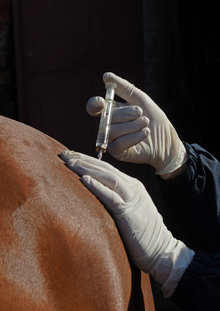During the past two weeks, infectious diseases including West Nile virus, Eastern equine encephalitis and rabies have taken their toll on horses throughout the USA. According to reports by the Equine Disease Communication Center, a number of horses have had to be euthanized because they were not protected by effective vaccination protocols.

Vaccinating a horse
According to reports by the Equine Disease Communication Center, a number of horses thorough out the USA have had to be euthanized because they were not protected by effective vaccination protocols.
© 2017 by Kondrashov MIkhail Evgenevich
Horses in Wisconsin, Louisiana, South Carolina, Florida, and California have contracted Eastern equine encephalitis.
On July 28th the Wisconsin Department of Agriculture, Trade, and Consumer Protection received notice of two confirmed cases of EEE. Both affected horses were yearling fillies owned by the same owner residing in Monroe County.
It was reported that both fillies were vaccinated in November 2016 and again in December 2016 but had not been vaccinated in 2017. One of the fillies died and one was euthanized after both showed severe neurologic signs. Cases confirmed (PCR) at WVDL. No quarantine was issued. These are the first cases of EEE reported in Wisconsin in 2017.
In Louisiana, nn unvaccinated horse in Iberville Parish tested positive for Eastern Equine Encephalitis (EEE) and Department of Agriculture and Forestry Commissioner Mike Strain, D.V.M., is reminding horse owners to vaccinate their animals for both Eastern Equine Encephalitis (EEE) and the West Nile Virus (WNV).
Cases of West Nile virus have been reported in Michigan, Wisconsin, Kentucky and Georgia. The Michigan Department of Agriculture and Rural Development received confirmation on July 28 that three Michigan horses tested positive for West Nile virus.
A 31 year old Arabian mare from Jackson County, an eight year old Arabian gelding from Livingston County and a 15 year old Standardbred gelding from Missaukee County developed severe neurologic signs which included incoordination, sweating, right sided facial paralysis, head pressing, paddling and an inability to stand. All three affected horses were euthanized.
In Minnesota, a horse in Benton County tested positive for rabies on July 24. The attending veterinarian initially examined the horse on July 18 and reported it was recumbent, but able to stand with assistance.
Additional clinical signs included facial spasms, low grade fever and incoordination. The horse was reportedly eating and drinking normally. The owner elected to euthanize the horse after it failed to respond to treatment.
The owner of the horse reported smelling a skunk in the area about two months prior to onset of illness. Currently, other animals on the property appear healthy, including two unvaccinated horses, several barn cats and livestock. The Board of Animal Health is investigating and will make recommendations to the property owner on what to do with the remaining animals.
The Minnesota Department of Health advised post-exposure prophylaxis for the owner of the horse, three family members, the attending veterinarian, and a veterinary student who assisted with treatment.
This is the first horse in Minnesota to test positive for rabies in 2017, and serves as a reminder that Rabies should be a differential for any horse presenting with neurologic signs. To date, 14 animals have tested positive throughout the state including five bats, one cat, one fox, six skunks and this horse.
